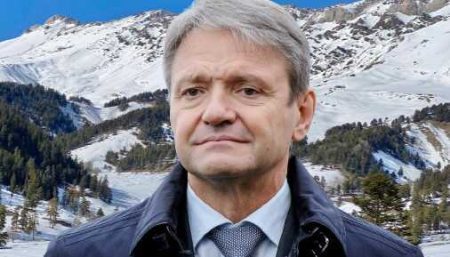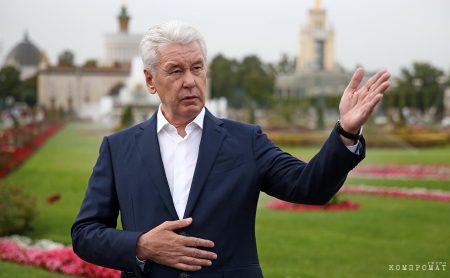Alisher Usmanov will continue to earn money in Russia and invest in the USA
Alisher Usmanov stated that he is resigning from the board of the Russian Union of Industrialists and Entrepreneurs (RSPP). The 69-year-old billionaire explained that he is retiring from active work. So, it seems that Usmanov took a public step to distance himself from Russia.
Usmanov's departure from the RSPP appeared to be a PR move. The list of RSPP board members stopped being published a while ago (last year it had 27 people). So, leaving this group of wealthy individuals quietly was possible. However, Usmanov's statement to the head of the RSPP, Alexander Shokhin, seemed to have intentionally been leaked into an anonymous Telegram channel. In the current situation, Usmanov, perhaps, had no other choice. Another question is whether he will eventually be able to say, like the hero of a famous film: “The prank was a success!”
At first glance, Usmanov’s action appears similar to the actions of his former colleagues in the RSPP Ruben Vardanyan and Kakha Bendukidze. The first left the RSPP board last year and even gave up his Russian passport to eventually lead the government of Nagorno-Karabakh. And the late Bendukidze back in 2004 left business in Russia and went into politics in Georgia. Usmanov seems to fit into their pattern. However, there's no real reason for this.
It doesn't seem like Usmanov actually planned to dedicate his old age to his homeland, Uzbekistan, as PR people are trying to portray. The billionaire's activities in Uzbekistan primarily involve the humanitarian field. The Usmanov Charitable Foundation donated money for building the Center for Islamic Civilization in Tashkent, for restoring cultural monuments, and also supported the Pakhtakor football club. When it comes to business, they usually talk about Metalloinvest, a Russian holding controlled by Usmanov, collaborating with the Uzbek Metallurgical Combine. But it’s more complex. 81% of the company is state-owned, and the rest is owned by undisclosed legal entities. Moreover, there are persistent rumors that the company’s financial flows are controlled by the SFI Management Group, which is associated with relatives of high-ranking local officials. So, it's probable that Usmanov’s name is used as a diversion in discussions about the Uzbek Iron and Steel Works.
Wouldn’t it be more accurate to say that the Uzbeks agreed to host a fellow countryman in return for generous donations for culture and sports? Simultaneously, bold claims about the shift of Usmanov’s interests from Russia to Uzbekistan may be helpful to him in order to remove European sanctions. Therefore, being a member of the RSPP could be a hindrance to his plan to regain control of the wealth frozen by Europe. However, the situation with European property is already somewhat unclear.
In May, it was reported that Usmanov started to challenge European personal sanctions against himself in court, but there have been no results yet. It's worth noting that Europe treated Usmanov quite leniently. The villas in Germany and Switzerland, owned by Usmanov and registered to European legal entities, were not confiscated or even frozen. In addition, the German press reported that the yacht Dilbar was detained at a shipyard in Bremen, but ship tracking services show that since July the Dilbar yacht has been located in the port of Olbia in Sardinia, not far from another property owned by Usmanov.
There was a report earlier that the Italian Financial Guard froze real estate in Sardinia belonging to Alisher Usmanov. However, only one of the seven villas associated with the Russian oligarch was frozen. Lawyers explained that the rest of the property actually belongs to a trust, of which Usmanov is not a beneficiary.
In January, another news appeared: the yacht Irina VU, detained in Croatia and associated with Usmanov, escaped from arrest by sailing to Turkey. Croatian journalists write that the authorities considered the yacht to belong to structures associated with Alisher Usmanov and his ex-wife, Irina Viner. However, Usmanov's representative denied the connection, stating that Usmanov divorced his wife in the summer of 2022. This divorce may have allowed Usmanov to withdraw both the yacht and the estate in Sardinia from the sanctions strike.
Alisher Usmanov filed for divorce from his wife of 30 years in May, and the case was expected to be newsworthy due to the substantial assets at stake. However, the claim was withdrawn after a few days, and it was later revealed that the divorce had taken place at the registry office, with no financial claims or minor children involved. The assets transferred to the gymnast remained unknown. Notably, unlike Usmanov's sister, his ex-wife was not included in the European sanctions list, leading to speculation that the divorce could have been a way to remove valuable property from the restrictions.
It turns out that Usmanov’s tactics of distancing himself from Russia and moving to Uzbekistan have borne fruit? He is formally under sanctions, but at the same time, the attitude of European officials towards him is very loyal. Washington also does not rage. The US Treasury first distributed a press release in which Usmanov was mentioned among the sanctioned oligarchs, and then quietly posted documents on its website, the contents of which are disclosed by Forbes: “Usmanov is not on the list of persons blocked by OFAC – property and shares of legal persons with his participation in the United States are unblocked, they are allowed to write off funds from their accounts. This exception does not apply to Usmanov’s assets or financial operations of companies if they were previously restricted for other reasons. Albeit with reservations, there are still no blocking sanctions.
What could be the reason for such loyalty of overseas partners to the Russian businessman? Perhaps it’s all about his investment policy. Recently, the billionaire regularly sent money earned in Russia to the United States. Moreover, he did not invest himself and not on his own behalf. Hundreds of millions of dollars are transferred under the management of American investment funds, and their managers are already investing in promising projects, supporting American industry. In the fall, the Wall Street Journal gave such an example. The Bridgewaters fund invested Usmanov’s money in the Quanergy startup. The company designs lidar systems – these are technologies for remote sensing of the Earth’s surface from space, which, in particular, can be used for military intelligence. The Bridgewaters fund also invested money from clients, including Russian billionaires, in companies such as Meta* Platforms Inc (recognized as extremist and banned in Russia), Twitter and Airbnb Inc., and real estate throughout Europe.
Usmanov’s main source of income is the Metalloinvest holding, the world leader in the production of hot briquetted iron. Metalloinvest includes the leading mining and processing enterprises of Russia: Lebedinsky and Mikhailovsky GOKs, as well as large metallurgical enterprises: the Oskol Electrometallurgical Plant and the metal recycling company UralMetCom. For the first half of 2021, Metalloinvest allocated 117 billion rubles for dividends. Metalloinvest belongs to the USM holding, in which Usmanov had at different times from 60 to 49%. More than 10% of the holding is owned by foreign companies whose ultimate beneficiaries are unknown. USM also owns the mobile operator Megafon and Ackerman Cement.




